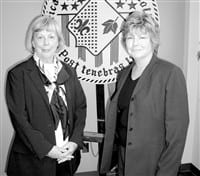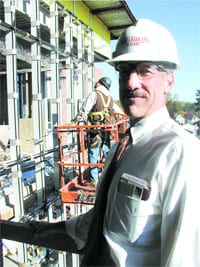Taking The Lead AIC Unveils New Master’s Program In Nursing To Prepare Executives, Instructors
Finding nurses trained and ready to work is a national concern.
But as more and more people respond to that need by making the decision to prepare for a career in health care, a new demand is forming – the need for nurses to teach and lead the new recruits.
In order to address the growing need for qualified leaders in the nursing field, faculty and administration at American International College (AIC) in Springfield announced recently that the school will offer a Master of Science in Nursing program as part of its graduate study curriculum. AIC is the only college in the Greater Springfield area to offer such a program.
Set to begin in January, 2005, the program will include two concentrations – nursing administration and nursing education. The two tracts were developed to address two aspects of the nursing shortage – nurses in leadership and executive roles, and nurses qualified to teach other nurses – according to Anne Glanovsky, director of nursing at AIC.
“There has been subtle talk of this for many years,” she said. “The nursing shortage is something of which we are all aware, but that shortage does not create only a lack of nurses in health care agencies, but of faculty and nurses in executive roles as well. We have a strong undergraduate nursing program here, and we want that to continue, and we want to address a need within our community.”
Leading the Leaders
The nursing shortage in Massachusetts peaked in 2002, according to the Massachusetts Hospital Association (MHA), and since then, the numbers of individuals studying for nursing degrees have soared. Local colleges have seen those increases in students; currently, the nursing division at AIC boasts the largest student enrollment of all of the school’s undergraduate programs, with 116 students – up a dramatic 87{06cf2b9696b159f874511d23dbc893eb1ac83014175ed30550cfff22781411e5} since 2002.
Though there is still a nursing shortage, there are many signs that the situation is improving. In the Commonwealth, the MHA reported last month, the percentage of registered nurse vacancies dropped from 8.5{06cf2b9696b159f874511d23dbc893eb1ac83014175ed30550cfff22781411e5} in 2003 to 6.8{06cf2b9696b159f874511d23dbc893eb1ac83014175ed30550cfff22781411e5} in 2004.
Sheila Rucki, a part-time faculty member at AIC with a clinical appointment at Baystate Medical Center, said the master’s program will further prepare nurses for advancement within their profession as younger nurses take entry-level jobs, and will continue to address the shortage of health care professionals in our own backyard.
“There is a real need for nurses in this area,” Rucki said. “We have an aging population of nurses that is reaching retirement age. There has been a resurgence in interest in the nursing field, but we need prepared teachers in order to address that interest.”
Glanovsky added that, historically, many AIC nursing students have remained in Western Mass. after graduating, taking jobs in area facilities.
The college first initiated its nursing division in 1978, in response to a need for baccalaureate-prepared nurses in the region, and the addition of an MSN program at AIC is a similar response to a community need, said Glanovsky. She told The Healthcare News that she hopes the trend of preparing nurses to work locally will continue with the addition of the master’s program, further boosting the area’s health care industry.
“Our students are likely to stay in the Valley, rather than try to find work in other parts of the country as at some other schools,” she said. “It’s exciting for us to see these nurses develop their careers right here.”
Preparing nurses for faculty positions isn’t the only pressing need, though. Karen Moore, president of the Mass. Organization of Nurse Executives and vice president of Hospital Operations at Franklin Medical Center, said that over the last decade, nurses have been asked to take on more and greater responsibilities, and administrative opportunities for nurses have grown as well.
“The timing is right to be a nursing leader,” she said. “There are more options out there for nurses, and these positions are critical to the strength of health care delivery.”
Thus, preparatory graduate programs like the MSN at AIC are essential, added Moore, because of the specialized skills needed to work in the health care profession – especially as an administrator.
“Being a nursing leader does not mean you are a nurse who has a business degree,” she said. “It is a specialty. We have our own body of knowledge, and we play a big part on many fronts. At the same time, we can’t lose sight of attention to the patient and support of the nursing practice.”
A Work In Progress
In order to prepare for leadership roles as professors or administrators, students at AIC will be expected to complete 39 credits of coursework, including 15 credits of ‘core’ classes, which will focus largely on theory and methodology. Drawing in part from the faculty base of AIC’s other schools and departments such as the School of Business Administration and the School of Psychology and Education, students will then choose a concentration and study either planning, project design, evaluation and management, or topics involved with collegiate-level teaching, Glanovsky said.
The program has also been designed to qualify master’s candidates for a degree in two years, and to cater to working nurses; courses will be held largely in the evenings, and will run through the summer months. Glanovsky said the nursing faculty at AIC will continue to offer the same individualized teaching approach to master’s candidates as they do for undergraduate students.
“Preparing nurses for careers that suit their interests and their strengths is the best way to address the need for qualified nurses in all areas of health care,” she said.
Rucki agreed, adding that practicums, which will be required for all master’s candidates, will also be catered to each individual student, depending on their interests in the nursing field. That, she said, will in turn address the need for nurses not only in traditional hospitals, but within nursing homes, assisted living facilities, specialty hospitals, and other settings as well.
“It all depends on where a nurse’s career is going,” she said.
Glanovsky said she is still unsure how many students will be accepted to the MSN program, however even prior to the college’s formal announcement of the new degree, applications and inquiries were already being accepted.
“The phones are ringing,” she said. “We are so proud, and so happy, and we’re ready.”



Comments are closed.